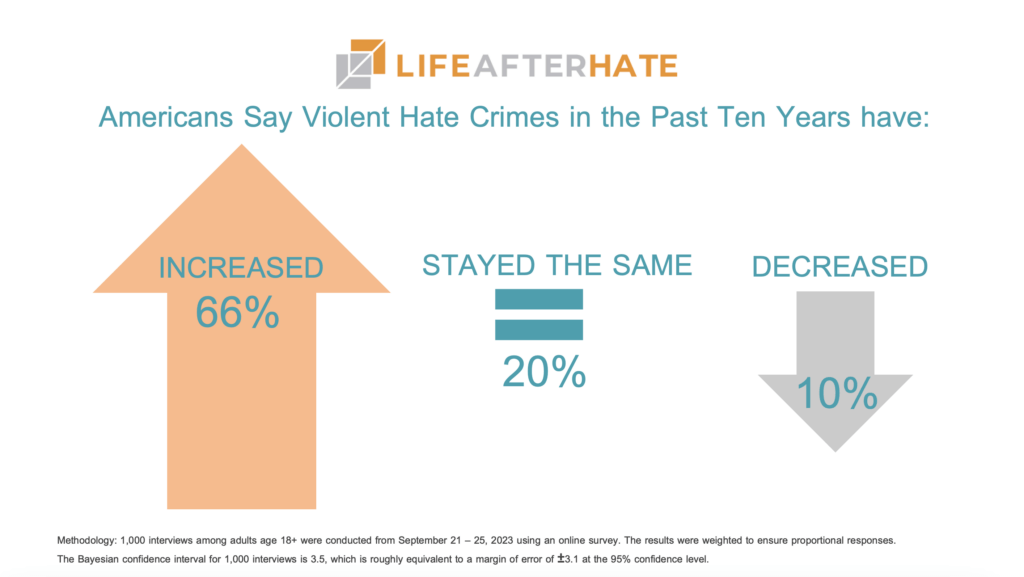New Survey Findings from Life After Hate Reveal Broad Agreement Across Demographics that Violent Hate Crimes Are on the Rise, With Notable Exceptions
MILWAUKEE, WI (October 17, 2023) –– A new national survey assessing Americans’ views on violent hate crimes finds that a two-thirds majority of respondents across a wide swath of demographic variables agree that the number of violent hate crimes in the United States has increased over the past 10 years, and that violent acts of hate should be considered domestic forms of terrorism.
The survey of 1,000 adults nationwide is released by Life After Hate, the nation’s leader in helping individuals disengage and deradicalize from violent far-right extremist groups and online hate spaces. It was conducted September 21–25, 2023 by analytic research firm, Lincoln Park Strategies.
“Violent extremism stands as a clear and present danger to this country and to the vast majority of its people,” said Patrick Riccards, Life After Hate executive director. “Hate crimes continue to rise, and we now see this for the dangerous problem it is. This is an issue we, as a nation, must both recognize and begin to seriously address.”
Two-Third Majority (66%) Say Number of Violent Hate Crimes in the United States has Increased Over the Past 10 Years
A majority of respondents (66%) across almost all demographics agreed that violent hate crimes are on the rise. Responses were statistically similar across gender, race/ethnicity, education, income, location, familial living situation, and political affiliation. Only age differentiated responses, with older respondents dramatically more likely to say the number has increased (83% of people 65+) than middle aged people (68% age 45-64) and younger adults (59% age under 45).
While one in five respondents (20%) say the number of violent hate crimes has stayed the same, one in 10 (10%) say the number has decreased. Respondents more likely to say the number has decreased were men under age 45 (21%).
According to the FBI, hate crimes have increased in the last decade. The latest data released in March tallied 12,144 hate crime offenses in 2021, including more than 4,600 assaults, rapes, and murders.

Two-Third Majority (68%) Say Violent Acts of Hate Should be Considered Domestic Forms of Terrorism
A majority of respondents (68%) across all demographics agreed that violent hate crimes are domestic terrorism, with those living in border states and Democrats (80% each) more likely to say yes, and those living in rural communities and Republicans (58% each) less likely to say yes.
Only 16% of respondents disagreed that violent acts of hate should be considered domestic forms of terrorism, and another 16% were not sure. Men were more likely than women to disagree (20% vs. 12%), particularly white men (22%) and men age 45-64 (25%), while college graduated women were least likely to disagree (8%).
The starkest differences in opinion stood among political affiliation, with Republicans (58% Yes, 22% No) and Democrats (80% Yes; 10% No) moderated by Independents (63% Yes, 18% No).
Almost Half (48%) Say Those Guilty of Violent Hate Crimes Likely Cannot Learn Not To Hate; One-Third (36%) Say Thinking Can Change
When asked if someone found guilty of committing a violent hate crime can change their ideology, or if their views are something they will always hold, almost half (48%) of respondents said that someone’s thinking will likely not change, while just over one-third (36%) said that thinking can change. Sixteen percent (16%) were not sure.
The only demographic group with a majority (51%) saying someone can learn not to hate were men under age 45, while women age 65+ were least likely to agree (18%). Adults 65+ were most likely to say someone’s thinking will not change (61%).
“We may not believe that one can deradicalize and disengage from violent extremism, but groups like Life After Hate have demonstrated for more than a decade that it is possible,” Riccards said. “We can build a safer community if we recognize violent extremism as the public threat it is and provide licensed social services to those brave enough to take accountability for their pasts and seek to change their hateful ways.”
Founded in 2011, Life After Hate is the nation’s leader in helping individuals disengage and deradicalize from violent far-right extremist groups and online hate spaces.

